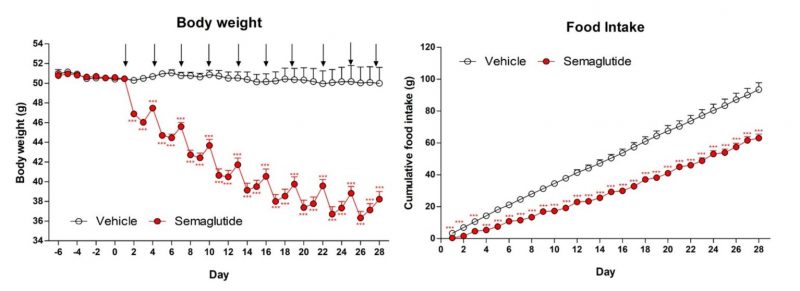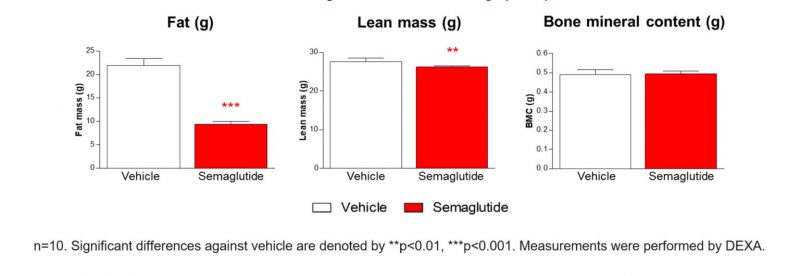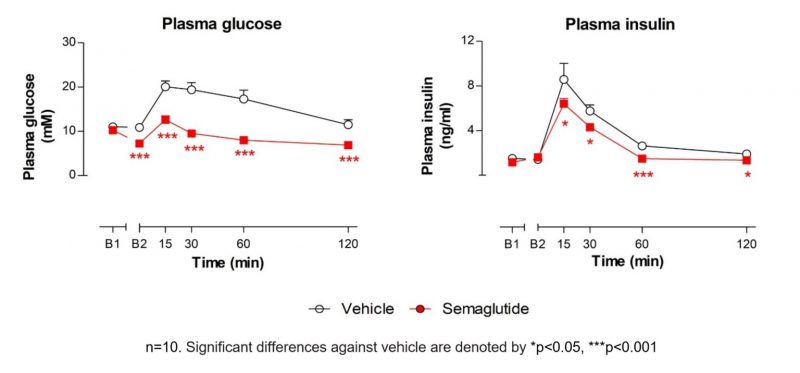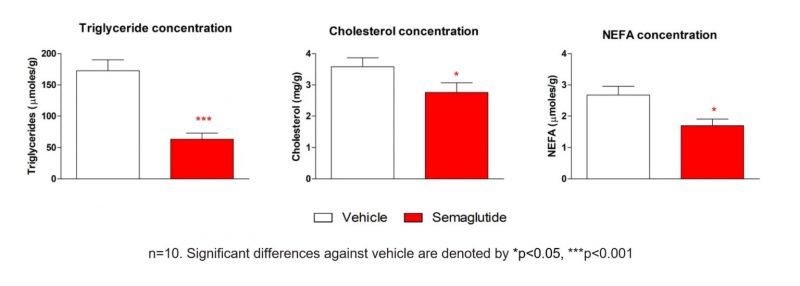The dietary-induced obese (DIO) mouse: A robust platform for the development of anti-obesity pharmacotherapies
There is a growing need for efficacious anti-obesity treatments that produce clinically meaningful, sustained weight loss and ultimately reduce the risk of developing associated metabolic comorbidities, such as diabetes, non-alcoholic steatohepatitis (NASH) and cardiovascular disease (CVD).
Of particular promise is the array of new pharmacological analogues of the glucagon-like peptide 1 (GLP-1), as well as other incretin-based approaches.
As such, in a continued effort to validate our models with clinically relevant comparators, we recently demonstrated that the long-acting GLP-1 receptor agonist, Semaglutide, was efficacious in our mouse model of dietary induced obesity (DIO).
We showed that twice-weekly administration of Semaglutide produced an impressive 24% reduction in body weight, which was associated with a 33% reduction in food intake, 57% decrease in adiposity and improved glucose control. These findings agree with the effects currently being reported in the clinic, and further demonstrate the predictive validity of our DIO mouse model for the development of anti-obesity pharmacotherapies.
Semaglutide reduced body weight by 24% and decreased cumulative food intake by 33% in the DIO mouse model:

Semaglutide decreased overall adiposity by 57% in the DIO mouse model:

Semaglutide improved glucose tolerance during an oral glucose challenge in the DIO mouse model:

Semaglutide decreased liver lipids (triglycerides, cholesterol, NEFA) in the DIO mouse model:

Importantly, our DIO mouse model is generated in-house by feeding a diet closely resembling the fat content of the western diet. Mice are ready to use “off the shelf”, therefore enabling a quick start to your study and a seamless transition from DIO induction phase to treatment.
Sygnature has specialised in animal models of metabolic diseases (formerly under the name RenaSci) for over 19 years and is an established provider of pre-clinical in vivo pharmacology services in this area.
We offer a range of assays and in vivo models to assess the therapeutic potential of novel drugs to treat obesity:
- Rodent models
- DIO and weight gain in mice and rats
- Most commercially available genetic models
- Drug-induced weight gain (Olanzapine, Pioglitazone)
- Acute Studies
- Food intake assessment (fed, fasted, dark-phase induced, palatable diet models)
- Behavioural profiling
- Gastric emptying
- Glucose and insulin tolerance (OGTT, IPGTT, IVGTT, ITT)
- Energy expenditure (by indirect calorimetry)
- Chronic Studies
- Chronic dosing or subcutaneous infusion (up to 12 weeks)
- Body weight, food and water intake
- Pair-feeding and weight-matching paradigms
- Body composition (validated scanning techniques or full chemical carcass analysis)
- Plasma, urine and liver metabolic parameters and biomarkers
- Glucose and insulin tolerance (OGTT, IPGTT, IVGTT, ITT)
- Energy expenditure (by indirect calorimetry)
- Faecal energy content
We offer full experimental design consultation, tailoring your study to your exact requirements. Contact us for additional information or to discuss your upcoming project.
